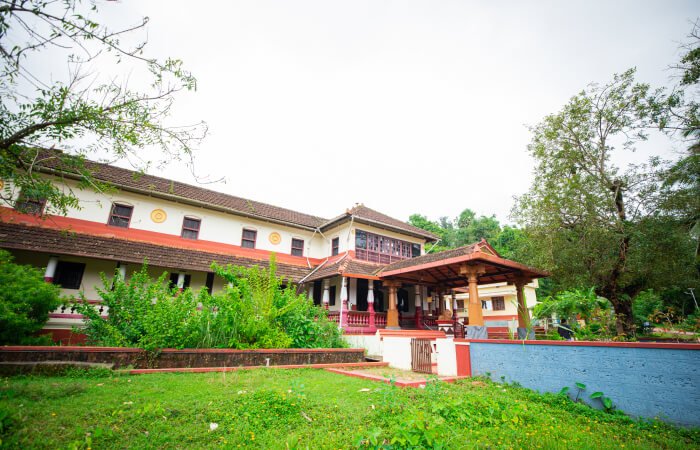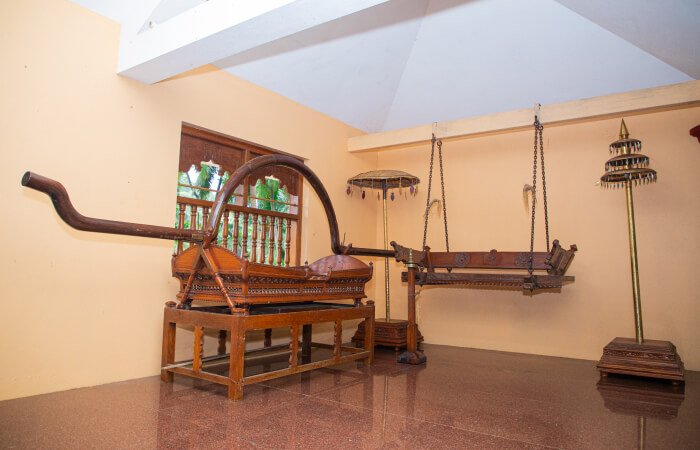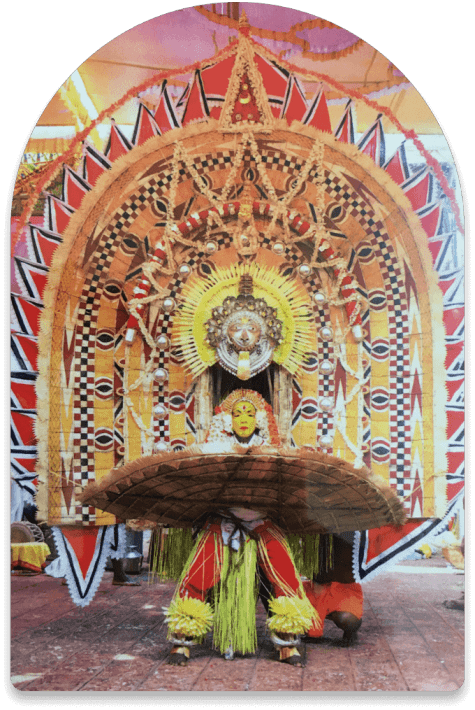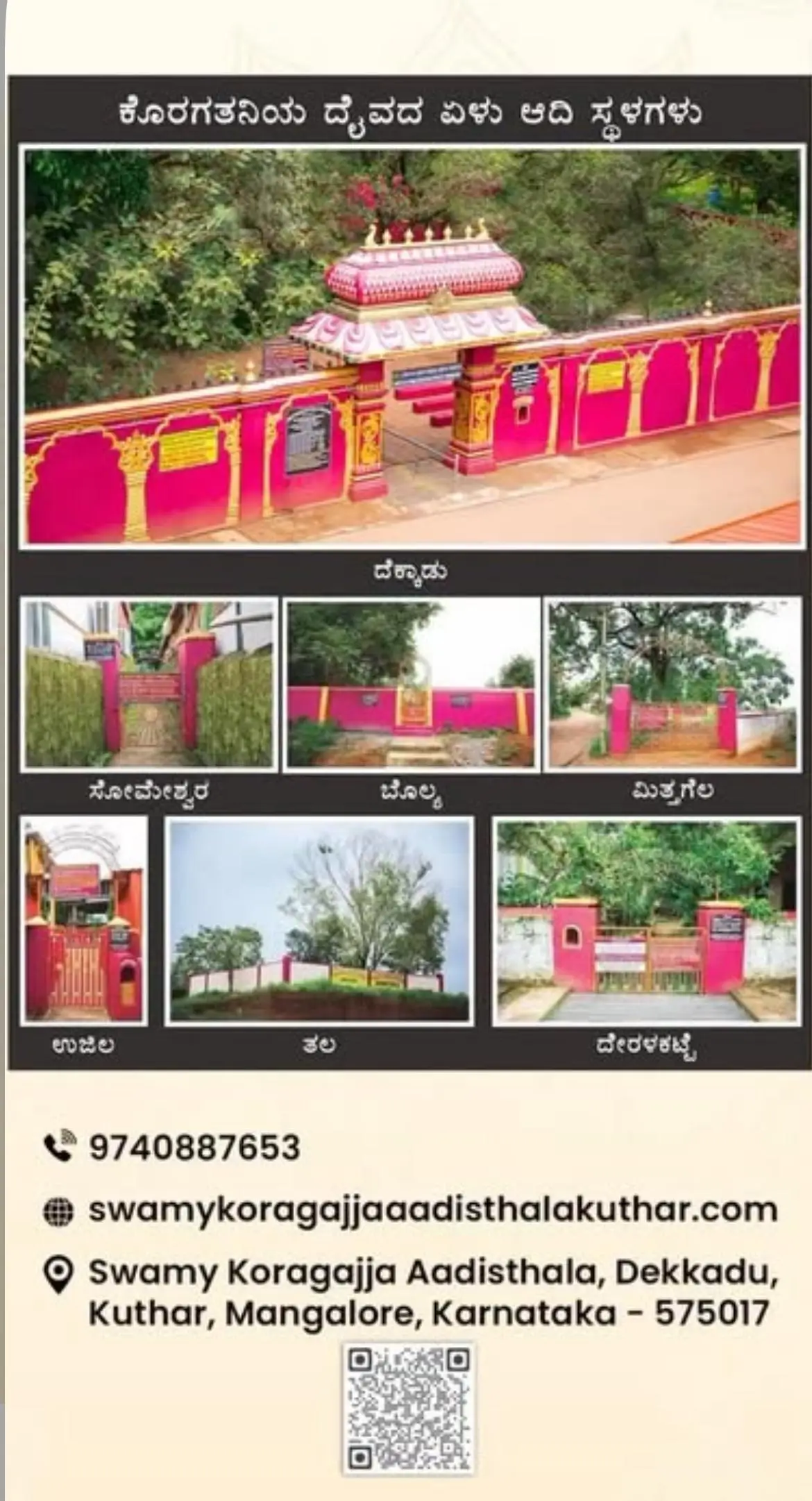





- || History ||
WELCOME TO KORAGATHANIYA DAIVADA AADISTHALA
How to reach us?
- Google Location Link
- From Mangalore KSRTC Bus Stand: 15 Kms (25 Mins)
- From Mangalore Central Railway Station: 11 Kms (25 Mins)
- From Mangalore Junction Railway Station: 9.8 Kms (21 Mins)
- From Bangalore: 346 Kms (7 hr 42 Mins)
- From Talapady Toll: 12.4 Kms (24 Mins)
- From Mangalore Airport: 21 Kms (37 Mins)

Swamy Koragajja Aadisthala, Kuthar – The Divine Abode of Justice and Blessings in Mangalore
Koragajja is not just a daiva; he is a symbol of justice, truth, and compassion, worshipped for centuries by the Tulu-speaking community. He is revered as a powerful guardian who listens to the cries of the common man and ensures justice is served, even beyond the realms of the legal system.
People from across Karnataka, Kerala, and even from abroad visit this sacred site in Kuthar, Mangalore to offer prayers, seek protection, and fulfill vows. The aura of this temple is one of faith, trust, and spiritual strength.

FAQ
What is the story of Swamy Koragajja?
When Koragathaniya was just 30 days old, his mother passed away. Thereafter even his father passed away and Koragathaniya became an orphan. Koragathaniya left his home Javanda Male, in the midnight and reached Bolungari. Sitting on the sand in Bolungari, he offered daddalkai (fruit of a tree called daddal in Tulu) and sand, instead of coconut and rice to god and prayed facing east. Just then a lady by the name Myrakke Baidyethi appeared before him.
Read More
Why Devotees Choose Swamy Koragajja Aadisthala, Kuthar?
Miracle Stories: Thousands of devotees have shared miraculous experiences after visiting.
Spiritual Power: The rituals performed here are believed to invoke the direct presence of Koragajja.
Where is Swamy Koragajja Aadisthala Kuthar located?
Kuthar junction, Ranipura road, near Bala samrakshana Kendra( ashrama, Mangaluru, Karnataka 575017
Google Location
Who is the mother of Koragajja?
Koragathaniya’s father’s name is ‘Varavana Odi’ and mother’s name is ‘Korapolu Maire’. When Koragathaniya was just 30 days old, his mother passed away.
What should I offer to Koragajja?
Toddy, alcohol, beeda & chakkuli are offer by the people.
Which are the 7 different Aadisthala's of Swamy Koragajja?
Seven aadisthalas of koragajja:
1. Dekkadu adisthala, kuthar.
2. Someshwara aadisthala
3. Bolya aadisthala
4. Mitha agela aadisthala
5. Ujila aadisthala
6. Thala aadisthala
7. Derlakatte aadisthala
Why Koragajja is Worshipped?
Koragajja is one of the most powerful Daivas of tulunad.koragajja has been fulfilling the wishes of his devotees & blessing them from time immemorial. Hence ,he is being worshipped by people far & wide.
Koragajja, an avatar of Lord Shiva, is worshipped in the Tulu Nadu region of southern India for his power to protect from evil spirits and diseases. The worship of Koragajja is characterized by elaborate rituals and offerings of food and drink, and is often accompanied by music and dance. Koragajja embodies the protective aspect of Lord Shiva and is revered for his ability to ward off evil and provide blessings to his devotees. The worship of Koragajja is an important part of the cultural and religious traditions of the Tulu Nadu region
Swamy Koragajja Story in English
Tulunadu is the abode of daivas. The traditions, culture, rituals and belief systems of this land has its own significance and importance. Daivaradhane is one of the main modes of worship prevailing in Tulunad. The residents of Tulunad have been worshipping the daivas with great devotion and faith from generations together. Daivas have been always guiding and protecting their devotees by warding off their miseries and fulfilling their wishes.
Read More
What is the other name of Koragajja?
‘Koragathaniya’ is the actual name of koragajja.
What is the favorite food of Koragajja?
People used to fondly offer him alcohol, betel nut, chakkuli. These things are considered as the favourite items for Lord Koragajja.